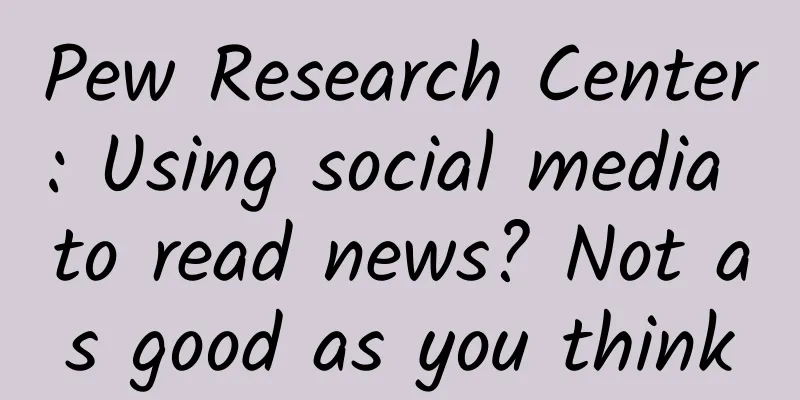Pew Research Center: Using social media to read news? Not as good as you think

|
1. People don’t see social media as an important source of news 2. People turn to Facebook and Twitter for real-time news In order to understand the mystery behind these two seemingly contradictory conclusions, media professionals need to analyze the research object of this report - social media. Columnist Alan Rosenblatt had several questions about the survey results. The question he was thinking about was: "How should media professionals continue to observe and report on the impact of social media?" In order to find the answer to his question, Rosenblatt consulted Amy Mitchell, director of the Pew Research Center. He then organized the interview into three questions and answers: Q1: Why is social media more likely to be used as a news source? For some people, getting information from social media means getting first-hand reports from the scene of the incident. At this time, witnesses at the scene of the relevant incident will use social media to share what they saw. Therefore, the source of the news report is not the social media that should be regarded as a medium of dissemination; the real source is still those who are reporting on the scene. However, many times people see news on social platforms and forward it directly without realizing that they should consider the source of the news report. Rosenblatt believes that when the Pew Center asked whether they used social media, it did not explain to the respondents what "social media" specifically refers to. In response to Rosenblatt's first question, Mitchell explained the Pew Center's findings: “As the number of new news providers surges, the ways to connect with them also become more diverse. In this context, people’s definitions of news and new ways of thinking about news are emerging. Throughout the research process, we have been trying to find the right answer to this question.” " Another difficulty in analyzing social media is that users' experiences are highly personalized. These behaviors are shaped by the choices a person makes in terms of habit formation, the practices that are popular in their network, and the design of the applications they use." Mitchell also pointed out that extensive contact with different user groups can help the research center understand more news sources. However, such research results are not accurate because it is very difficult to understand how people get a certain information. Usually people can't remember where they got the information and through what channels. Q2: The news has been forwarded layer by layer. Do you still remember where it came from? In response to this question, Mitchell said: "I admit that in most cases, after a news report has been circulated many times, readers will unconsciously regard the social media platform as the original source of the report." In this kind of news sharing that is forwarded layer by layer on social platforms, the audience is like in a "word of mouth" mode, and they don't know that the news information they got was originally obtained by reading a newspaper, listening to the radio or talking to another friend. "The focus of our investigation is to find out what instant media users rely on to obtain their knowledge reserves. More importantly, our research has repeatedly shown that the 'word of mouth' model is an extremely important information dissemination channel. " Q3: What are the side effects of journalists’ over-reliance on social media platforms? This is Rosenblatt's last question, and Mitchell's answer is: “Indeed, news organizations and journalists may already know how to use social media very well; they are even very good at using this platform in their work. Past survey results of the Pew Research Center show that social media is only seen as a platform for information dissemination, but not as a way to connect with news audiences. ” "During the 2008 and 2012 US elections, we studied how campaigns used social media. Typically, these campaigns used social media platforms to stay engaged with voters and to keep in touch with journalists." Finally, Rosenblatt believes that if the media cannot adjust their attitude accordingly when facing these problems, then there will be a lot of "harm" in reporting based on social platforms: low-quality reports will not only fail to show people the true situation of the media and tell people how to efficiently filter information, but will even leave a negative image of social media in people's minds, ultimately causing people to abandon the habit of obtaining news information through social media. via: All Media |
<<: Revealed: It turns out that rhinitis makes people ugly in this way!
Recommend
What to do if a woman has a big vagina
In fact, both men and women have reproductive org...
Bleeding again one week after period ends
Menstruation is a sign of being a woman. As long ...
Dull pain in right abdomen after abortion
Most women who become pregnant without any prepar...
What happens if you take cold medicine during pregnancy?
Everyone knows that you cannot take medicine duri...
The reason why the genitals are itchy
The genitals are a reproductive organ that is pro...
What to do if you have excessive drooling during early pregnancy
Since pregnancy, due to more or less changes in a...
Can sperm ingestion lead to pregnancy?
Pregnancy will not occur if sperm enters the anus...
Why do I feel pain in my chest and back during late pregnancy?
As we all know, pregnancy is very hard for women....
Treatment of bacterial vaginitis and candidal vaginitis
Many people often confuse vaginitis with candidal...
Advantages of the placenta at the bottom of the uterus
A normal placenta should be attached to the botto...
Symptoms of high mental stress in women
Life is not an easy thing for young people today,...
What are the harms of induced abortion to women?
Induced labor is what many women want after five ...
The nutritional value and efficacy of mangosteen. What should not be eaten with mangosteen?
Eating some mangosteen in moderation in the hot s...
Is it normal to have menstruation in the second month after giving birth?
We all know that women do not have menstruation d...
How to help cervical dilation for primiparas
For the first child, pregnant women should promot...









